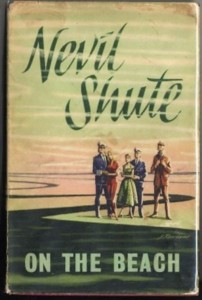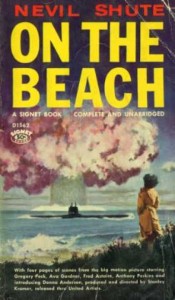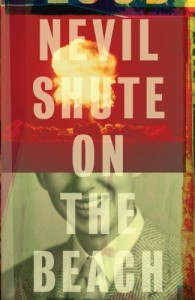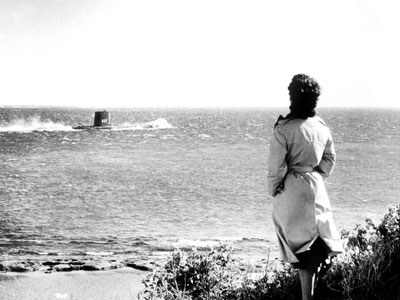On the Beach
By Nevil Shute
Original edition: Heinemann, 1957
Most recent edition: Vintage International, 2010
Original film adaptation: United Artists, 1959; produced and directed by Stanley Kramer; screenplay by John Paxton; starring Gregory Peck, Ava Gardner, Fred Astaire, and Anthony Perkins
How can a novel about the man-induced extinction of all higher life forms on Earth be a ringing affirmation of the decency of humankind?
This may seem a very difficult – indeed, a peculiar – trick to pull off. But Nevil Shute’s 1957 bestselling novel about the aftermath of an atomic war manages to do it, and in resounding fashion.
The novel’s plot is straightforward; no clever plot twists will claim the reader’s attention, and the inevitable end of all animal life on the planet higher than that of the insects is not averted in the final pages by some Act of God or Act of Science. Shute, writing in the mid-1950s, set his novel only a decade hence, in 1964. By that time, he postulated, even small, poor, formerly insignificant nations would have atomic weapons. Bulgaria drops the first atomic bomb of the one-month-long World War Three, which occurs entirely in the Northern Hemisphere. Egypt uses Russian-made bombers to launch an atomic attack on an American city, which the Americans mistake for a Soviet attack. The Americans retaliate. In quick order, the USSR and China are launching cobalt bombs at each other, seeking to extinguish one another’s populations in North-Central Asia. The resulting radioactive dust clouds wipe out all human and most animal life in the Northern Hemisphere. Atmospheric exchanges gradually draw the radioactive clouds into the Southern Hemisphere. About two and a half years after the one-month war, the only remaining survivors of humanity live in the southernmost parts of Australia, New Zealand, South Africa, and South America. The survivors in Oceania will last the longest. When the novel begins, the residents of Melbourne, Australia are aware that the cloud is scheduled to reach them in less than nine months.
The novel primarily focuses on five characters: Dwight Towers, captain of the American nuclear submarine USS Scorpion, which he has placed under the command of the Royal Australian Navy; Moira Davidson, a young Australian woman who becomes Dwight’s companion; Peter Holmes, an Australian naval officer assigned to the Scorpion as a liaison officer, and his wife Mary, who reside with their infant daughter in a suburb outside Melbourne; and John Osborne, Moira’s cousin, an Australian scientist who joins the crew of the Scorpion on the submarine’s reconnaissance mission to the west coast of the continental United States, Alaska, and Hawaii. As skillfully as each of these major characters is delineated, one of the novel’s primary pleasures is Shute’s brief portrayals of minor characters and how they cope with the coming end of the world. This panoply of character sketches adds greatly to the novel’s rich texture and gives weight to Shute’s ultimately optimistic vision of his fellow men.
In Shute’s novel, contrary to depictions of societal chaos in the preponderance of post-atomic war and apocalyptic fiction and film, civilization does not break down in the face of the coming extinction of humanity. Life continues on mostly as it did pre-war in Melbourne and its surrounding suburbs and farms, the main difference being a lack of petrol, which has necessitated the replacement of most automobiles with bicycles or horse-drawn carts (although the local availability of coal means that the electric trains and trolleys have continued to run). The other major difference, unremarked upon by any characters in the book but obvious to the readers, is an increased kindness and thoughtfulness, expressed in words and acts shared between friends, family members, merchants and customers, and strangers. Virtually all of the characters, major and minor, determine for themselves to carry on as best they can to the end, remaining as true as possible to their best selves and to whatever they view as their most central duties and responsibilities. It is this quiet heroism, heroism in a minor key – not simply stoicism in the face of impending death but a nearly universal decision to try to brighten the remaining lives around them and to face the end with shared decency – that gives a novel which would otherwise be unrelentingly grim and dispiriting a powerful, memorable surge of uplift. Through his skillful use of understatement, Shute provides uplift without schmaltz (a feat the film version only rarely manages). One has the sense that even those characters who do not expect themselves to be judged by God in an afterlife expect to be judged by themselves in their final moments, and they attempt to live their last months accordingly.
I came to love and respect each of the characters in a way I have rarely loved and respected fictional characters. Most of the characters manage to get through their days in reasonably good psychological shape through heavy reliance on denial. They tell themselves the radioactive cloud will fail to reach Melbourne, or that the “Jorgensen Effect” will cleanse the atmosphere of most radioactivity before too much air is recirculated between the Northern Hemisphere and Southern Australia, or that death will be merely a prelude to a return home to beloved family. But Shute shows us that his people are very self-aware of their use of denial, and they very gently and compassionately support one another in that therapeutic deployment of fantasy. Moira, who has never married nor ever been meaningfully in love, falls deeply in love with Dwight. Dwight, however, left a wife, Sharon, and two young children behind in Connecticut. His sense of honor and his still very much alive feelings of love for and commitment to his family do not allow him to consummate a romance with Moira, despite the very strong attraction he feels toward her, and his growing gratitude for her kindnesses and nobility of spirit.
When they first meet, Moira is almost continuously drunk, having no notion what to do with herself in the few months remaining to her. Yet her relationship with Dwight quickly matures her. Despite her overwhelming desire for him, she refuses to degrade him and herself by pushing herself upon him before his grief has expended itself (which, given the few months left to them, it never will). He keeps himself from emotionally falling to pieces by pretending that his family are still alive and waiting for him back in Connecticut. Moira mends Dwight’s shirts and sweater for him, telling him she wouldn’t want to send him back to Sharon looking shabby, and she helps him find a fishing rod and a rare pogo stick as gifts for his son and daughter, gifts that he stores in his tiny quarters aboard the Scorpion. To his credit, Dwight recognizes the emotional strain his decision to remain faithful to his dead wife is placing upon Moira. Each time they make plans to do things together, he asks her if she will be all right with things, meaning a failure to consummate their romance. Near the end, when they take a weekend trip into the mountains for the first days of the trout fishing season, they book two separate cabins. Yet neither allows the awkwardness of their situation to diminish their enjoyment of the beautiful scenery, the challenges of catching fish, and the camaraderie they experience with the numerous other guests at the cabins. Once the cloud of radiation has settled thickly onto the Melbourne area, and only hours of life remain for most, Moira asks Dwight if she may accompany him and his crew aboard the Scorpion while they take the submarine into international waters to scuttle her and end their own lives. Dwight, in a decision that may come across as cruel, opts to remain true to the regulations of the U.S. Navy and refuses her request; he is also concerned about being fair to his men, whom he had not allowed to bring their own girlfriends along. Moira does not hold this against him, recognizing that he is remaining true to his code, and that if he were to abandon that code, even at the very end, he would no longer be the same man she had fallen in love with. She finds a place on a bluff overlooking the passage to the open sea where she can watch the Scorpion pass by.
Moira is not the only major character to show extraordinary kindness under conditions of duress. Throughout the book, Peter indulges his wife Mary’s desire to improve their garden, despite the fact that neither of them will get to see their newly planted bulbs bloom or the newly planted trees mature. One of Peter’s last acts, after he has already begun suffering the symptoms of radiation sickness, is to drive into downtown Melbourne and find the garden swing she has wanted so badly, so that she might be able to look at it through the window of their apartment while confined to bed in her final hours. The argument between Peter and Mary which takes place before he ships out on the Scorpion‘s two-month-long reconnaissance, sparked by Peter’s gentle insistence that Mary know how to properly administer poison to their infant daughter should he fail to return and be unavailable to do it when the deadly cloud arrives, is made much more stunning in its impact because it is virtually the only violent emotional outburst in the entire book. (Mary’s character was ill-served by the 1959 Stanley Kramer film version. Under the dictates of John Paxton’s screenplay, newcomer Donna Anderson played Mary as a neurotic, unstable, immature woman, who does not achieve the grace exhibited by the novel’s Mary until the film’s closing scenes.) Even John, the major character with the fewest emotional ties and the most detached personality, tenderly takes care of his elderly mother in her final, ailing hours.
Adherence to duty, responsibility, and personal code of conduct is exhibited nearly across the board. Shute makes reference to weekend crowds in Melbourne who become riotously drunk and to street sweepers who abandon their jobs in the last weeks, allowing the streets of Melbourne to become filthy and putrid, but the writer does not dwell on these persons who let their community and their fellows down. Instead, he focuses on the trolley driver who insists he will drive his trolley until he is no longer able to, particularly after having already done so for thirty-four years; and on the dairy farmer who promises Peter to make home deliveries of milk to Mary and the baby while Peter is on the other side of the world. There is an amusing, and at the same time very touching, debate in the government over whether or not trout fishing season should be opened a month early. Should the government stick to its traditional calendar, the season would not open until several weeks after the radioactive cloud is expected to arrive. However, if they opt to allow early fishing, the stock of fish could be damaged. They eventually decide to allow the earlier date, with misgivings, but justify their decision as being “just for this one year only.” When Dwight realizes the time has come to scuttle the Scorpion, he issues a formal request to the First Naval Member to withdraw the submarine from Australian command and return her to the U.S. Navy (of which she is the last surviving operational vessel). The elaborate courtesies and formalities the two of them exchange as the senior surviving members of their naval establishments, which have enjoyed a long history of cooperation and fellowship, form a perfect capstone to Shute’s portrayals of the two men. I found this scene to be intensely moving.
Much of this focus on duty, compassion, and the forgoing of satisfaction of immediate desires in favor of remaining true to strongly held personal codes went by the wayside in Stanley Kramer’s film adaptation, apparently to the dismay of Nevil Shute. Kramer tailored the story both to what he assumed to be American audiences’ expectations of a romantic drama and to his own desire to forge an unambiguously antiwar message. The character of John Osborne (renamed Julian Osborne in the script) is changed from an Australian scientist to a stranded British nuclear scientist, who had formerly worked on the British atomic bomb program, this so that Fred Astaire could wallow in drunken guilt over his role in abetting the nuclear holocaust. Kramer and screenwriter John Paxton also opted to spice things up a bit by giving Julian and Moira a failed romantic past (in the novel, they are distant cousins, affectionate with one another but never having shared a romance). The biggest change from the novel is that Dwight and Moira, after a bit of hesitation on Dwight’s part, consummate their romance. According to film lore, Kramer was apprehensive that audiences would not buy Gregory Peck’s ability to resist Ava Gardner’s charms throughout the whole movie, and ticket buyers might leave the show feeling disappointed if Peck and Gardner were not shown to get it on. Peck, reportedly, sided with Shute but was overruled by Kramer. I could have done with the Gregory Peck of his earlier film, Roman Holiday, when he portrayed an American reporter in Rome who becomes entangled with a slumming European princess but who manages to remain a gentleman throughout, recognizing that her duties of state would not allow for a romance with an American commoner. Peck was an absolute natural to play the duty- and memory-bound Dwight Towers; that the film’s producer/director insisted that the cores of both Peck’s and Gardner’s characters be carved out and discarded was a shame.
This is not to say that the 1959 film is without its merits. Its black and white cinematography is crisp, effective, and consistently well framed; the film is a pleasure to watch. Kramer made the decision to move the scene of the Scorpion‘s crew’s discovery of the source of mysterious Morse code transmissions from a naval installation in Seattle, as portrayed in the novel, to an oil refinery in San Diego, a wise choice. The long shots of a sole sailor in a radiation protection suit running down the streets of the massive, abandoned oil refinery are silently eloquent of the strange, quiet death of civilization. Most of the supporting and minor characters are marvelously cast (avoiding the pitfalls, for example, of Fred Astaire’s and Anthony Perkin’s weak English and Australian accents and the absence of any attempt on Ava Gardner’s part to vocalize an Australian accent at all). Several of my favorite scenes involve Paddy Moran’s Stevens, the wine steward of a private club where Julian, Peter, and Dwight go to dine. Stevens is constantly having to right the portraits on the club’s walls of various British royals and military heroes, which go askew any time the doors are pulled shut. Near the film’s end, when he is the last person alive in the club, Stevens takes the opportunity, which he has obviously pined for through decades of service, to have his turn at the billiards table. Filmed without any background music, it is a shattering moment, much more emotionally affecting than the final scene Kramer chose to hit his audiences over the head with, a shot of an abandoned Salvation Army rally with a banner that reads, “There is Still Time… Brother!”
Two minor characters appear in the film who were not present in the novel: Admiral Bridie of the Royal Australian Navy, played by John Tate, and the admiral’s secretary, Lieutenant Osgood, played by Lola Brooks. I have read nothing that states this was the case, but I suspect Kramer included these two as a sort of apology and amends to Nevil Shute for bowdlerizing the characters of Dwight and Moira. Whenever the two appear together, there are hints of attraction between the admiral and his young, pretty female secretary. Once they have both begun to come down with symptoms of radiation poisoning, after Dwight has pulled the Scorpion from Australian command and there is nothing left to be done in the headquarters of the Royal Australian Navy, Admiral Bridie asks Lieutenant Osgood if she would like to be relieved of her duties and return home. She opts to stay at her post, saying there is no one waiting for her at her home, no husband or boyfriend or family. The admiral asks her if she would care to share a glass of wine with an old man. She says, “No, but I would like to have a glass of wine with you.” The few words and the lingering look that pass between them as they each sip from their glasses of wine speak volumes about the intensity of their mutual attraction and the forbearance each has shown and will show to the end. Neither will step over the line of proper conduct between a senior officer and his subordinate, but they absolutely smolder together. Watching the intensity of their quiet, understated interaction, this viewer was struck by an intimation of what could have been the relationship between Gregory Peck’s Dwight and Ava Gardner’s Moira, a truer reflection of Nevil Shute’s devastatingly poignant novel.
I have not seen the 2000 television version, made for Australian TV. From the description, it seems Shute’s conceit that civilization in the Melbourne area survives, mostly intact, up until the deaths of its inhabitants was done away with. Civilization ends brutally, just as it does in the Mad Max films. Perhaps this choice by the filmmakers, who obviously did not consider Shute’s vision of the end to be plausible, is an indication of how far our faith in the durability of our Western social order has fallen in the half-century since Shute wrote his book.




